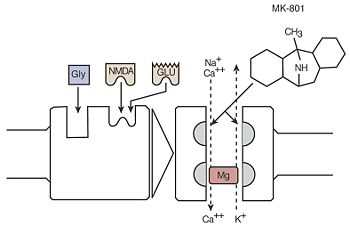N-methyl-d-aspartate receptor
Jump to navigation
Jump to search

(PD) Image: National Institute on Alcohol Abuse and Alcoholism
Activation occurs when either glutamate (Glu) or N-methyl-d-aspartate (NMDA) and glycine (Gly) bind to the receptor molecule. A channel within the receptor complex enables molecules to cross the cell membrane. Magnesium (Mg) blocks this channel. When Mg is removed from the channel and the receptor is activated, calcium (Ca2+) and sodium (Na+) ions enter the cell and potassium ions (K+) leave. MK-801 prevents the flow of ions across the membrane by binding to a site within the ion channel, thereby blocking NMDA receptor function and protecting the cell against excess activation (i.e., excitotoxicity).
Activation occurs when either glutamate (Glu) or N-methyl-d-aspartate (NMDA) and glycine (Gly) bind to the receptor molecule. A channel within the receptor complex enables molecules to cross the cell membrane. Magnesium (Mg) blocks this channel. When Mg is removed from the channel and the receptor is activated, calcium (Ca2+) and sodium (Na+) ions enter the cell and potassium ions (K+) leave. MK-801 prevents the flow of ions across the membrane by binding to a site within the ion channel, thereby blocking NMDA receptor function and protecting the cell against excess activation (i.e., excitotoxicity).
The N-methyl-d-aspartate receptor (NMDA receptor) is the binding site for glutamate, n-methyl-d-aspartate and glycine.[1] NMDA receptors are ionotropic as they allow calcium and sodium ions to flow into the cell while potassium ions leave. This excitatory change hypopolarizes the cell and makes it more likely to fire.
NMDA receptors are implicated in memory and learning through the process of long-term potentiation.
Pharmacology
NMDA receptor inhibitors
NMDA receptor antagonists include ketamine, memantine, dextromethorphan, methadone, and MK-801.
NMDA receptor inhibitors may help treat dementia[2] and tolerance to opioid analgesics[3].
References
- ↑ Anonymous (2025), N-methyl-d-aspartate receptor (English). Medical Subject Headings. U.S. National Library of Medicine.
- ↑ Ellul J, Archer N, Foy CM, et al (March 2007). "The effects of commonly prescribed drugs in patients with Alzheimer's disease on the rate of deterioration". J. Neurol. Neurosurg. Psychiatr. 78 (3): 233–9. DOI:10.1136/jnnp.2006.104034. PMID 17012333. Research Blogging.
- ↑ Prommer E (2006). "Rotating methadone to other opioids: a lesson in the mechanisms of opioid tolerance and opioid-induced pain.". J Palliat Med 9 (2): 488-93. DOI:10.1089/jpm.2006.9.488. PMID 16629581. Research Blogging.